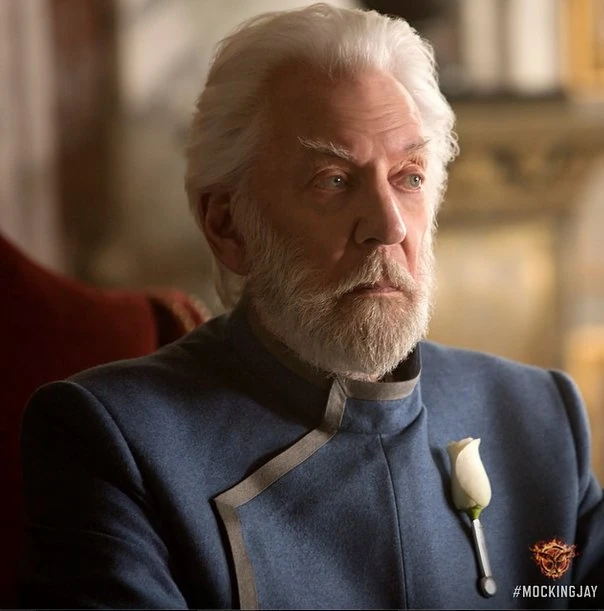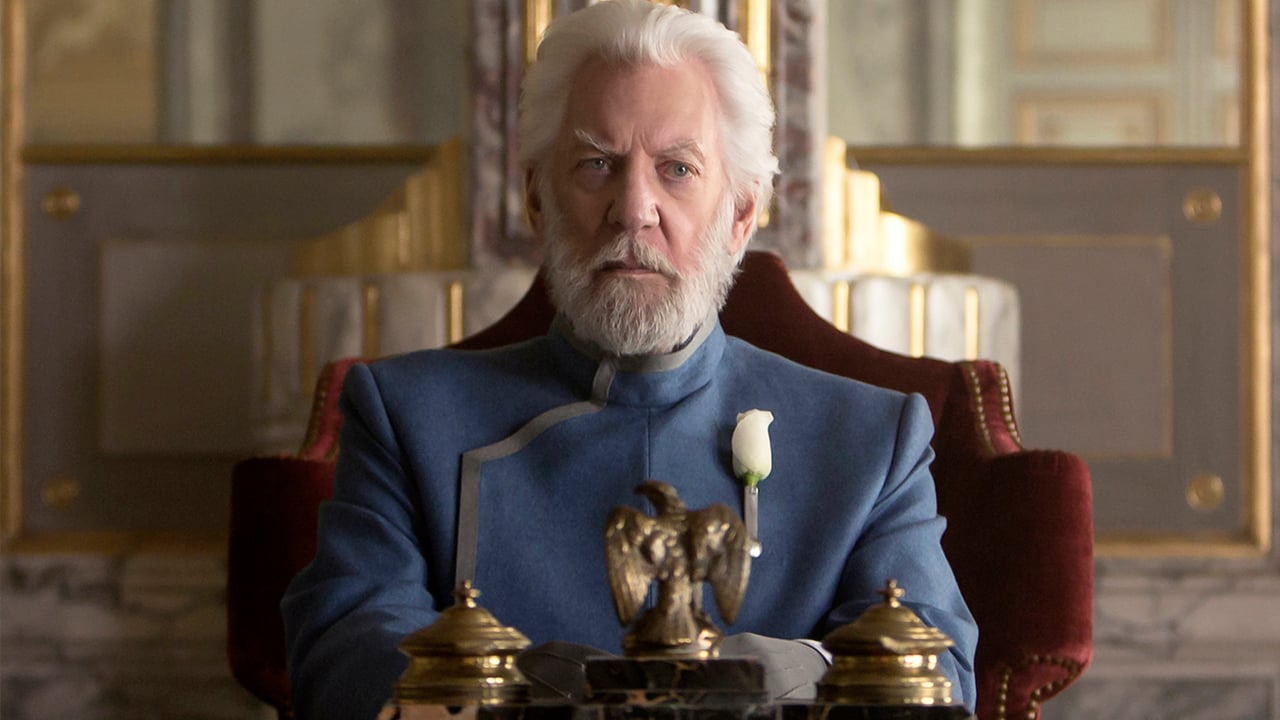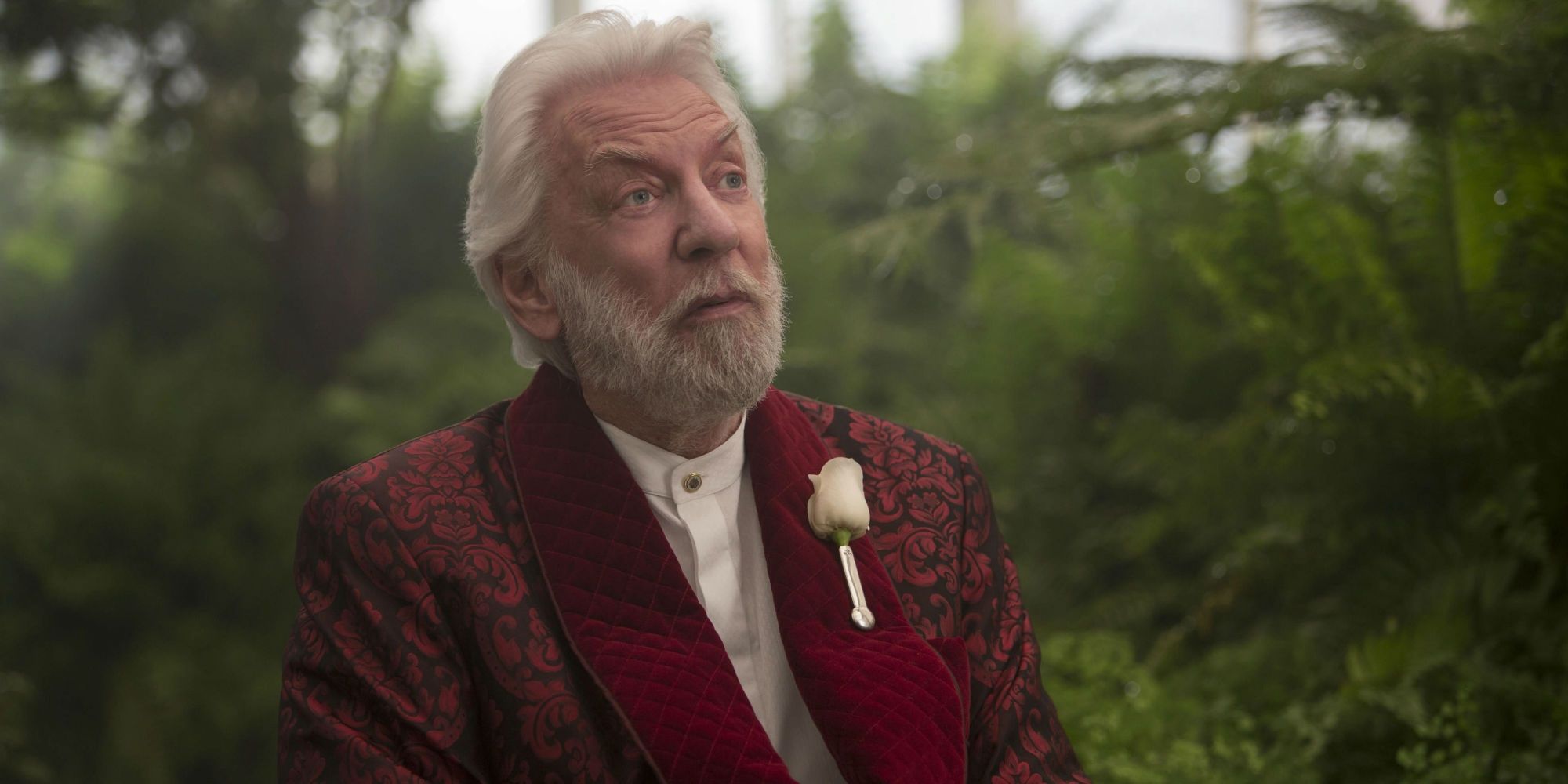President Snow Hunger Games - A Look At The Capitol's Ruler
When we think about the story of Panem, it's pretty hard to ignore the figure who stood at the very top, the one who pulled so many strings and held so much sway. Coriolanus Snow, the leader of the Capitol, cast a really long shadow over everyone and everything, a presence that shaped the lives of countless people for decades. His way of running things, his ideas about control and power, well, they were truly the foundation of that world, and understanding him helps us get a better grasp of the entire saga.
So, you know, his influence wasn't just about the yearly spectacle of the Games; it was about the way society worked, the fear that lingered, and the very air people breathed in the districts. He was, in a way, the central point around which all the suffering and all the resistance eventually spun. To really get a sense of the challenges faced by characters like Katniss Everdeen, it's quite important to consider the person who created the rules and enforced them with such a firm hand.
This article will take a closer look at the life and impact of this powerful individual, exploring what made him tick and how his actions left such a deep mark on the fictional nation. We'll consider his journey, his methods, and the kind of world he sought to build, or perhaps, to maintain, for that matter. It's a chance to think about the complexities of leadership, even in a fictional setting, and what happens when control becomes the ultimate goal.
Table of Contents
- The Life and Times of Coriolanus Snow
- What Drove President Snow's Actions in the Hunger Games?
- How Did President Snow Maintain His Grip on Panem?
- The Capitol's Architect - President Snow's Vision for Panem
- President Snow and the Seeds of Rebellion
- Was President Snow Truly a Villain, or a Product of His Circumstances?
- The Legacy of President Snow in the Hunger Games Saga
- What Lessons Can We Take From President Snow's Rule?
The Life and Times of Coriolanus Snow
Coriolanus Snow, the individual who would one day lead the entire nation of Panem, came from a family that had seen better days, actually. His early life, particularly as a young person, was shaped by a time when his family's standing in society was not what it once had been. They had lost much of their fortune and influence during a period of widespread conflict, a time known as the Dark Days. This personal experience of decline, of seeing his family's reputation diminish, seems to have had a really big impact on the person he became, in a way.
He was, you know, a very smart young man, and he possessed a sharp mind for strategy and a strong desire to restore his family's name to its former glory. This ambition, this deep-seated need for respect and power, began to show itself even when he was quite young. His experiences as a mentor in the tenth annual Games, a time when the spectacle was still finding its footing, proved to be a pivotal point in his life's path. It was during this period that he started to learn the true nature of power and how to wield it over others, especially those who were struggling to survive.
His ascent to the highest office was not a sudden event; it was a slow and deliberate climb, marked by clever moves and a willingness to do what he felt was necessary to secure his position. He understood, quite clearly, that the path to control involved more than just brute force. It required a deep grasp of human behavior, a knack for manipulation, and a readiness to make difficult choices that would benefit his own standing and the stability of the Capitol, as he saw it. So, in many respects, his entire existence became a testament to his drive for authority.
Personal Details of Coriolanus Snow
| Full Name | Coriolanus Snow |
| Position | President of Panem |
| Affiliation | Capitol |
| Key Traits | Ambitious, manipulative, intelligent, ruthless, obsessed with control |
| Signature Symbol | White rose |
What Drove President Snow's Actions in the Hunger Games?
One might wonder, really, what truly motivated a person like President Snow to oversee something as brutal as the Hunger Games. At its core, his actions seemed to stem from a profound belief that strict control was the only way to maintain order and prevent another uprising like the one that had nearly destroyed Panem in the past. He saw the Games, in a sense, as a necessary evil, a tool to remind the districts of the Capitol's absolute authority and the consequences of disobedience. It was, for him, a matter of survival for the Capitol and its way of life, and he was absolutely committed to that idea.
Beyond this desire for societal stability, there was also a very personal motivation at play. His early experiences with poverty and the loss of his family's standing instilled in him a deep fear of losing power and influence. This personal history made him incredibly determined to never again be in a position of weakness. So, every decision he made, every cruel act he sanctioned, could be seen as a way to fortify his own position and ensure that he, and by extension the Capitol, would never again face the kind of challenge that had once brought them to their knees, you know.
He also seemed to derive a certain satisfaction from wielding power, from being the one who dictated the terms of existence for millions. The Games were not just a political instrument; they were a personal display of his dominance, a yearly reaffirmation of his ability to shape reality for everyone else. It was, perhaps, a twisted form of pride that fueled his continued commitment to the system, making him a figure who would stop at almost nothing to keep his grip on the nation, as a matter of fact.
How Did President Snow Maintain His Grip on Panem?
Keeping an entire nation, especially one divided into struggling districts, under such tight control for so long is quite a feat, and President Snow had a very specific set of methods he employed. The Hunger Games themselves were, of course, the most visible and terrifying instrument of his rule. They served as a yearly, stark reminder of the districts' defeat and the Capitol's absolute power over life and death. This spectacle was designed to crush any hope of rebellion and to foster division among the districts, preventing them from forming any kind of united front, you know.
Beyond the Games, Snow relied heavily on a sophisticated system of surveillance and information control. He made sure that the Capitol's message was the only one that truly got through, shaping public opinion and making it very difficult for any dissenting ideas to take root. People in the districts lived with the constant awareness that they were being watched, that any act of defiance could bring swift and severe consequences. This atmosphere of fear was a powerful tool, keeping most people in line through sheer intimidation, more or less.
He also used propaganda to paint a picture of the Capitol as a benevolent protector, providing order and stability, even as it exploited the districts for their resources. The message was that the Games were a necessary sacrifice for peace, a way to prevent the chaos of the past from returning. This carefully crafted narrative, combined with swift and brutal punishment for any who dared to challenge it, allowed him to maintain his position for many, many years. Basically, he understood that control over people's minds was just as important as control over their bodies.
The Capitol's Architect - President Snow's Vision for Panem
President Snow had a very clear, if chilling, vision for what Panem should be, and he worked tirelessly to make that vision a reality. His idea of a stable society was one where the Capitol stood as the unchallengeable center of everything, a place of luxury and absolute authority, while the districts existed solely to serve its needs. He believed that this strict hierarchy was not just practical, but absolutely essential for the survival of their civilization, that is what he thought, anyway.
He saw the people of the districts as resources, plain and simple, there to provide the materials and labor that kept the Capitol running. Their lives, their struggles, their very existence, were secondary to the prosperity and comfort of the Capitol's citizens. This view meant that any glimmer of independence or self-determination from the districts was seen as a direct threat to his carefully constructed order, something to be stamped out with extreme prejudice. He was, in a way, the ultimate manager of a system built on exploitation.
His vision was one of perpetual obedience, enforced through a cycle of punishment and reminder. The Hunger Games were the yearly centerpiece of this vision, a ritualistic display of dominance meant to extinguish any spark of hope or collective action. He truly believed that by keeping the districts weak, divided, and terrified, he could ensure Panem would never again experience the turmoil of rebellion. This unwavering commitment to his particular idea of peace, achieved through force, was a defining characteristic of President Snow and his reign.
President Snow and the Seeds of Rebellion
Despite President Snow's very firm control and his best efforts to suppress any form of dissent, his rule, ironically, also planted the seeds for the very rebellion he worked so hard to prevent. The extreme conditions in the districts, the constant hunger, the brutal enforcement of rules, and the sheer injustice of the Games themselves, all contributed to a growing resentment that simmered beneath the surface. People can only be pushed so far, you know, before something eventually gives way, and his policies pushed them to their limits.
The very public nature of the Hunger Games, meant to instill fear, also inadvertently created heroes and symbols of defiance. When tributes, like Katniss Everdeen, showed acts of courage or rebellion within the arena, these moments were broadcast across Panem. These small acts, even if unintentional, began to inspire hope and a sense of shared grievance among the district populations. It was, in some respects, a miscalculation on Snow's part, underestimating the power of human spirit even when faced with incredible odds, that is what happened, basically.
His unwavering commitment to his system, his refusal to yield even a little bit, meant that there was no peaceful path for change. This absolute rigidity pushed people towards more extreme measures, making rebellion seem like the only option left for those who wished for a different way of life. So, while he sought to crush all opposition, his actions ultimately solidified the resolve of those who would rise against him, leading to the eventual downfall of his long-standing rule.
Was President Snow Truly a Villain, or a Product of His Circumstances?
When we look at President Snow, it's easy to label him as a purely evil character, given the suffering he caused and the system he upheld. However, some might wonder if his actions were, in some way, shaped by the difficult circumstances of his own upbringing and the history of Panem. He grew up in the aftermath of a devastating war, a time when the very existence of the Capitol was threatened, and this experience deeply influenced his perspective on order and control, as a matter of fact.
He genuinely believed, or at least convinced himself, that the Hunger Games and his iron-fisted rule were necessary to prevent another civil war, to keep Panem from tearing itself apart once more. From his point of view, he was making the hard choices required to maintain peace, even if those choices involved immense cruelty. He saw himself as a protector of the Capitol's way of life, and perhaps, in his own twisted logic, even a savior of the nation from what he perceived as its own destructive tendencies, you know.
However, even if his motivations stemmed from a place of fear or a desire for stability, the methods he employed and the sheer disregard he showed for human life are very difficult to excuse. His actions went far beyond what could be considered mere pragmatism; they demonstrated a deep-seated enjoyment of power and a complete lack of empathy for those he controlled. So, while his past might offer some explanation for his mindset, it doesn't really diminish the fact that he chose to be the architect of so much pain and oppression, that is the truth of it.
The Legacy of President Snow in the Hunger Games Saga
Even after his eventual demise, the impact of President Snow continued to be felt throughout Panem, leaving a lasting mark on the world of the Hunger Games. His long rule shaped the political landscape, the social structures, and the very psychology of its inhabitants for decades. The scars of his presidency, the memories of the Games, and the fear he instilled, did not simply disappear overnight. They lingered, influencing the challenges faced by the new leadership and the people trying to build a better future, you know.
His legacy is, in many ways, a stark reminder of the dangers of unchecked power and the corrupting influence it can have on an individual. He became a symbol of tyranny, a cautionary tale for anyone who might seek to control others through fear and manipulation. The efforts to rebuild Panem and create a more just society were, in a sense, a direct response to the oppressive system he had so carefully constructed, trying to undo the damage he had inflicted, more or less.
Furthermore, his character continues to be a subject of discussion and analysis, even in a fictional context, because he represents a certain kind of leader who believes that the end justifies any means. His story serves as a very powerful example of how a desire for order, when taken to its extreme, can lead to incredible human suffering and ultimately, to its own undoing. So, his presence, even in absence, remains a significant part of the entire narrative.
What Lessons Can We Take From President Snow's Rule?
Looking at the story of President Snow and his time in charge offers us some important ideas to consider, even though it's a fictional tale. One big lesson is about the dangers of power that goes unchecked, power that isn't balanced by accountability or compassion. Snow's rule shows us what can happen when one person or a small group has absolute authority and uses it without any real concern for the well-being of others, that is a very clear point, really.
Another thing to think about is how fear can be used as a tool to control people, but also how it can eventually backfire. Snow tried to keep everyone in line through terror, through the very public displays of the Hunger Games. But this constant fear, over time, bred a deep resentment and a desire for freedom that ultimately became too strong to contain. It suggests that while fear might work for a while, it's not a sustainable way to lead people, you know.
His story also highlights the importance of empathy and understanding different perspectives. Snow's inability to see the people of the districts as anything more than resources, his complete lack of feeling for their suffering, was a big part of his downfall. It reminds us that truly effective leadership, even in the real world, often involves listening to people, understanding their needs, and seeking common ground, rather than simply imposing one's will. So, in some respects, his example shows us what not to do.
This exploration of President Snow, the leader of Panem in the Hunger Games, has touched upon his background, the motivations behind his actions, the methods he used to keep his nation under his thumb, and the lasting impact he had. We've considered his specific vision for society, how his very actions inadvertently sparked the rebellion he feared, and whether his circumstances could ever truly excuse his choices. Finally, we looked at the continuing lessons that can be drawn from his long and controlling rule.

Coriolanus Snow | The Hunger Games Wiki | Fandom

Who Is President Snow In 'The Hunger Games'? Explained | The Mary Sue

The Hunger Games: Why President Snow Coughs Up Blood, Explained